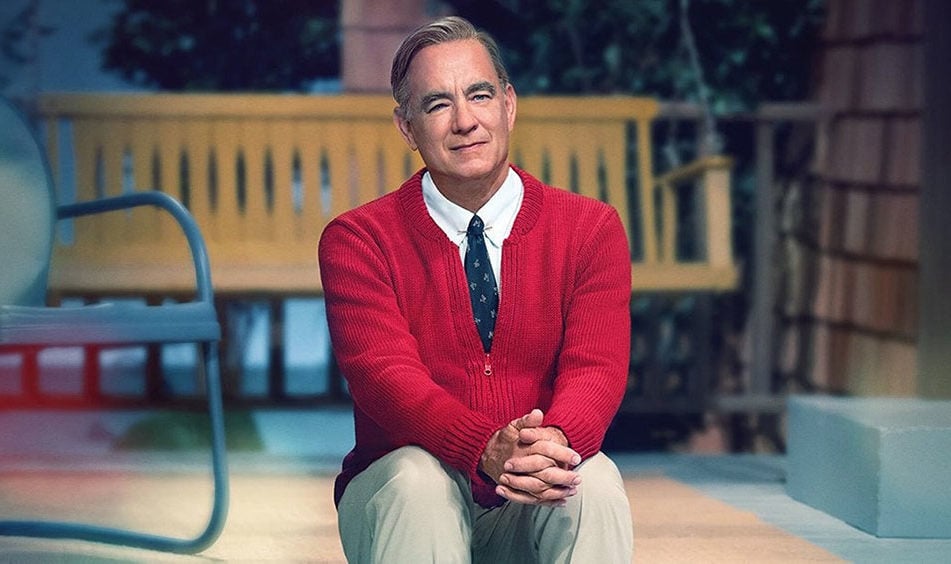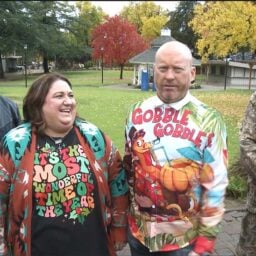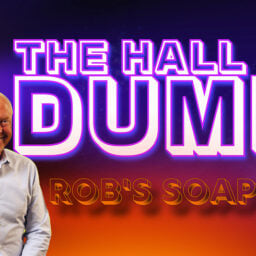Brandon’s Review:
Admittedly, I was not expecting much from what I thought would be a biopic of Mister Rogers and his neighborhood. I was expecting an overacted performance from Tom Hanks as he portrayed one of America’s greatest icons that influenced generations of youth, only to tee himself up for an Oscar. During the opening scene, Hanks takes center stage and performs the famous Neighborhood intro, complete with song and wardrobe change. While the real Fred Rogers was much more gaunt and thin at stage in his life that this film takes place (1998), Hanks obviously didn’t go method as he is quite chunkier than Mister Rogers. As a viewer, you quickly look past that as you realize that Mister Rogers is about to tell you a story about a writer for a magazine. This particular writer has been tormented by anger and self-loathing caused by childhood trauma and a troubled relationship with his estranged father. Well, this isn’t a biopic at all. It turns out that Mister Rogers takes on more of a supporting role as he comes to the aid of this suffering magazine writer. It wasn’t until after the film that I realized that this is all based on a true story and article published in Esquire Magazine over 20 years ago. The names were changed, and some scenes were embellished or added for dramatic effect, but the message was clear. “A Beautiful Day In The Neighborhood” pays homage to the man who listened patiently, was gentle and helped those who knew him or watched his program understand honest expression of feelings.
It’s safe to say that I felt like I sat through a cathartic therapy session, and found myself relating to the troubled writer. Not many know this, but I am constantly battling with this demon of self-loathing and general anger at the world. This darkness stems from unresolved family conflict, childhood trauma and the untimely loss of my mother in 2013. Life isn’t easy and sometimes it’s easier to suppress or push away feelings or even those who are closest for fear of dealing with the issues at hand. I could relate so much to the main character of this film. He lost his way and was unable to forgive or express gratitude to those around him. Instead, he was bitter and confrontational. It wasn’t until he started interviewing Mister Rogers that he started to see the err in his ways. The scenes where Hanks’ rendition of Fred Rogers talks with the fictional writer, Lloyd Vogel, based on the real-life writer Tom Junod, served as the turning points in the writer’s developments towards peace and happiness. In one scene, Mister Rogers encourages the writer to take :60 seconds to sit in silence in the middle of a diner while they were at lunch together and think about all of those who “loved you into existence.” The entire restaurant goes quiet, and there is a moment where Tom Hanks turns his gaze from the writer, right into the camera, enticing the viewer to do the same. And we did. I did. It was powerful, to say the least. This is but one of a handful of scenes where Mister Rogers digs deep in his classic, emotional intelligence to help us navigate the feelings we are going through in those moments.
There is one quote that is playing back over and over in my head, even hours after watching the movie. In reference to death, Mister Rogers says “Anything that’s human is mentionable, and anything that is mentionable can be more manageable.” That is an actual quote from Fred Rogers that I hadn’t heard before, and it resonates so strongly with me. Not only in relation to death, but to life as well. We all have conflict and pain in our lives. We must manage our humanity in order to work through the pain. Maybe you have felt similar to how Tom Junod, Lloyd Vogel or even myself has felt at some point in your life, or even currently. Maybe you can find some sort of solace and forgiveness in yourself or for those who may have hurt you. As Fred Rogers once said, “Knowing that we can be loved exactly as we are gives us all the best opportunity for growing into the healthiest of people.”
Thumbs up.
—
Original article of which the film was based off of: https://www.esquire.com/entertainment/tv/a27134/can-you-say-hero-esq1198/










